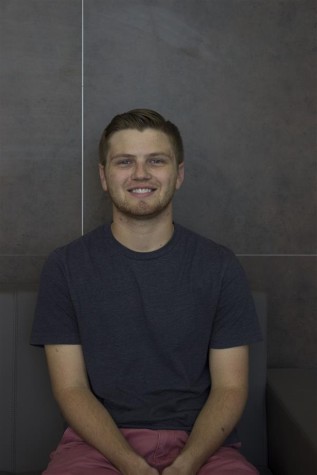The memories of that August night are fuzzy. The four grams of cheese heroin, a mixture of heroin and Tylenol PM, he bought in Flower Mound. A blur. The ride back to the Colony after snorting two of the grams. A blur. The person that left him to die after overdosing on the last two grams. A blur. As he is now passed out on his bedroom floor at his dad’s house, the countdown to death has begun. From there, he doesn’t remember a thing. But those closest to him do.
For someone that tried marijuana for the first time in the seventh grade, Dillon Thomas’ drug use escalated quickly. By the ninth grade he had started using harder drugs. Salvia, cocaine, ecstasy, painkillers. He’d experimented a little. But Thomas wasn’t just a drug addict. He was a varsity football player, a popular guy at school. He passed all of his classes. He was walking the line between success and destruction.
And it had come to this. Lying limp on the floor, his body was shutting down. Life was draining out of him and hope was fading quickly. One of his first times trying heroin would likely be his last.
His sister, Ashlyn, found him. He was making an awful noise, one she will never forget. He had aspirated on his own vomit. Most of it now was in his lungs. He was running out of time. Quickly Ashlyn called 911. Then she called Thomas’ mom and dad. Brain function minimal. Heart function minimal. The roller coaster of his life began its descent down the first big hill.
“He was gasping for air,” Thomas’ mom, Katherine Davison, said. “He was basically on his last breath.”
The emergency crews hurried Thomas to Baylor Carrollton, trying to keep him alive long enough to reach the hospital. When Davison came rushing in, she asked the doctor how bad her son was. The doctor held her hand then started crying. Thomas was so critically ill that doctors didn’t even think he would live long enough to get transported to the Intensive Care Unit, which was only two floors above them.
Six hours later, the doctors finally stabilized Thomas enough to move him to the ICU. Even then, almost every single organ in his body was failing.
At 9:30 a.m., the doctors returned to Thomas’ room. It would be a simple procedure, they said. We’ll go in and clear out the vomit from his lungs. Unfortunately, things seldom go as planned. In fact, sometimes they can go terribly wrong.
As they attempted to clear Thomas’ lungs, his comatose body gave out. With his liver enlarged, kidneys only functioning through constant dialysis and his entire system in a coma, the procedure was too much. The room quickly turned into chaos. His heart leaped into cardiac arrest as white coats surrounded him. The probing in his chest also caused his lung to collapse. The heart monitor flat-lined.
“They came and got us, me and his dad,” Davison said. “And I couldn’t watch. The whole room was filled with people with machines, beating and shocking his chest.”
All she and Thomas’ father could do was wait outside and listen while medical staff tried desperately to pound Thomas’ heart back into action. Overcome by emotion, they fell to their knees. Thomas’ parents didn’t know what else to do, as they hoped that their son wouldn’t die that August 11 morning. For the second time in less than 24 hours, it seemed their only son was lost.
After a few minutes, however, they revived him. All Thomas’ mom and dad could do was hope that the horrific ride would end soon. But it didn’t.
***
For the next five weeks the dreaded thrill ride continued. Thomas remained on complete life support. He was almost lost in the jumble of tubes that came out of his body. The tube spiraling out of his stomach fed him. The tube protruding from his trachea breathed life into him. Two other tubes excreted wastes from his body.
Although he was no longer technically in a coma a month later, Thomas remained unconscious. Brain activity was still little to none. His kidneys began to recuperate but progress was slow. Neurologically speaking, doctors still had no clue. Would he be himself again or would he be a vegetable? It was anyone’s guess.
“The best assumption was that he was in a vegetative state and would be put in a nursing home,” Davison said. “No one could tell you, so it was kind of like a gamble. What do you do?”
Each of the nine or so doctors could only say one thing. He was healthy, and he was young. Thomas’ parents took it day by day, forever contemplating if he should stay on life support or not. People questioned their judgment. The whole family was divided. Some told Thomas’ parents that he would come out a vegetable. They told stories of people pulling the plug. But it wasn’t as simple as that. There wasn’t an on/off switch for his body now. His feeding tube would have to be pulled out. Taking him off of life support would mean starving him to death.
“It’s all the unknown,” Davison said. “It’s all the things we don’t have answers for, and when you’re in that situation, you just have to go with your gut.”
Put him out of his pain or give him a chance at life? That was the question. No person could be sure of Thomas’ future. So they just kept taking it day by day, step by step. Hope seemed to always keep clinging to them.
***
Thomas was transferred to MedicalCity in Dallas on Sept. 17. His organs had been stabilized. He remained unconscious, and his bone marrow was not functioning. In other words, his blood cells weren’t reproducing. After receiving many blood transfusions, he was still running out of red and white blood cells. He critically needed a bone marrow transplant, but his body was too unstable. On Sept. 19, the surgeon came in. He broke the news to Thomas’ parents. It was death either way.
They would have to make arrangements. His mom wondered if all of the hope and perseverance was for nothing. Maybe the relatives were right. Maybe they should have pulled the feeding tube long ago.
“I made funeral arrangements twice,” Davison said. “We knew what we were going to bury him in, his football uniform. I knew that’s what he’d want.”
The service was planned. Music selected and the casket picked out. Thoughts and emotions ran through his mom’s head, but out of all of them, one stuck out. Relief. It was a horrible thought but it was there. Relief that all the pain could end. The chaos and emotional swings that had defined their lives for more than a month could finally stop. But hope still remained
It was almost like Thomas heard the conversation between his parents and the doctor from his unconscious state. After two more days his blood count started to come back up. Against all odds, it seemed his bone marrow was regenerating. Indeed there was life in that body, a body that had gone from 220 pounds to around 150.
The surgeon came back to talk to Thomas’ parents. He had the giddiest expression on his face, especially for a doctor of his caliber, a hematologist surgeon that hadn’t shown much emotion at all. Thomas was beyond a medical miracle. His chances of survival were slim to none, one in a million. He had surpassed all prognoses and expectations. Although death continued to pursue him, Thomas had sidestepped it again.
“I’m a mom who couldn’t stop a freight train, but I put up hurdles and roadblocks in the way,” Davison said. “Dillon is a freight train. The freight train is what put him in his state and the freight train is what got him out of it. He is a fighter that knows no limits.”
A couple days later, around Sept. 20, Dillon began to come out of unconsciousness for the first time in over five weeks. His mother and father stood beside his hospital bed, each holding one of his hands. Thomas made his first attempts to open his eyes. While his eyelids struggled to open all the way he squeezed his parents’ hands.
“He made faces,” Davison said. “The best way to describe it is that he looked like he was grimacing in pain.”
All of a sudden, he opened his mouth. His parents hesitated to see what their son would say. Although the tracheotomy tube in his throat hampered his speech, Thomas managed to gasp a couple words. Very faintly he said “I’m sorry.”
“Dillon has always made excuses to why everything is not his fault,” Davison said. “I thought it was profound that the first thing he said is that he was sorry.”
***
On Oct. 9, all of Thomas’ nurses that had been caring for him for the past month came into the room. Dressed in their light blue scrubs, they gathered around the hospital bed. With much difficulty, he managed to form his facial muscles into a big smile. As the other ladies glowed with joy, one of the female nurses serenaded Thomas with “Happy Birthday.”
On his 18th birthday, Thomas was released from Medical City to Baylor Institute of Rehabilitation. It wouldn’t be easy though. He would have to relearn the most basic actions like walking and talking. Although it didn’t mean going home, being transported to Baylor was another step in the right direction.
A little over a week later, while Thomas was just beginning a long road of grueling recovery at Baylor Rehab Hospital, seniors Christa Rickerson and Kaitlyn Abraham put together a video of Marcus students showing support for Thomas.
Abraham and Rickerson had traveled the halls of the school for a couple of weeks to compile footage of former teammates and friends of Thomas wishing him a speedy recovery. Over fifty students took part in the video.
Thomas was sitting in his wheelchair when Abraham and Rickerson came to visit. He strained to look at who was entering. Since Thomas had little movement in his neck and none in his arms, they held up the screen for him to see. He laughed throughout the video, glad to see friends supporting him.
“I know who my true friends are now,” Thomas said. “Some of the people I thought would come visit me didn’t come visit me.”
Friends and family played a huge role in Thomas’ long stay in the hospital and recovery. Aunts, uncles, grandparents and other relatives came from across the country, thinking it would be their last time to see Thomas. Friends, including former Marcus student Matt Lennox and senior Wyatt Verret, pushed him down the halls in his wheelchair and brought him his favorite candies, Raisinets and Sour Patch Kids. Several other friends also helped entertain and support Thomas in his three-month long hospital stay. Lennox said he realized how much of a miracle it was to see his friend again and wanted to make sure he would be there for him through his recovery and into the future.
“I want to keep in touch and check up on him,” Lennox said. “If he feels tempted at all, I want him to tell us so we can talk about it. We need to be his positive influence.”
***
His mom puts on Thomas’ left sock and shoe first, tickling his foot in the process. He laughs but still has trouble with basic actions like this. As he tries to bring his right foot onto his mom’s knee for the other sock and shoe, his leg limply falls back to the floor. Thomas still has no feeling in his right foot, causing him difficulty in the struggle of relearning to walk.
He also has trouble speaking, as the brain and nervous system have yet to fully recover. Despite all the pains and hardships Thomas and his family have endured over the past months, he still plans to walk with Marcus at graduation in June.
Now an aspiring entrepreneur, Thomas juggles multiple things in his life. Neurological therapy Mondays, Wednesdays and Fridays helps him relearn basic skills like walking and talking. A private tutor Tuesdays and Thursdays helps him stay on track with school work at his mom and stepdad’s Bridlewood home. As he sits in his wheelchair, Thomas tries to really grasp all that he’s been through.
“I didn’t realize until a little while after that I am really blessed,” Thomas said. “Looking back, I’m glad it happened.”
Of all he has learned through his stay at various hospitals, another lesson sticks out in his mind. Thomas doesn’t deny that drugs are the sole cause of all the chaos and disorder that have defined life for him and his family since mid-August.
“Don’t think marijuana isn’t a gateway drug,” Thomas said. “Once you get into the harder drugs you never know what’s going to happen. You never know if you’re going to overdose.”
As they eat pizza and play board games, Thomas and his mom enjoy the time they have together. If the entire ordeal has taught them anything, it’s to value something like a game of Uno, even if Thomas wins every time. In hind sight, Davison takes joy in the fact that they never gave up hope. She realizes that if her daughter hadn’t acted so quickly and she had listened to some of her own family, Thomas wouldn’t be here today.
“I’m not proud of what he’s done but I’m not ashamed either,” Davison said. “I’ll be ashamed if he doesn’t take advantage of this second chance he has been given.”







